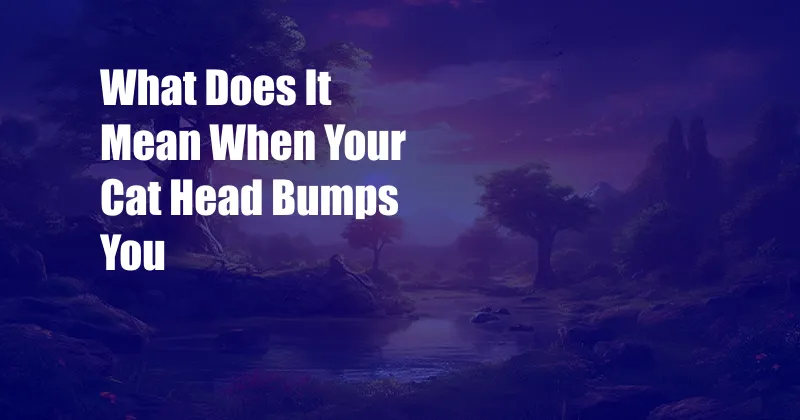
When Your Cat Head-bumps You: A Meaningful Expression
Cats are affectionate creatures that express their love and emotions through various behaviors, among them is the gentle gesture of head-bumping. Witnessing your feline companion head-bumping you is a heart-warming experience. In this article, we will delve into the profound meaning behind this adorable act, providing insights from experts and our own observations. So, let’s unravel the enchanting enigma of feline head-bumping.
Within the fascinating world of feline communication, head-bumping holds a significant place. It’s commonly referred to as “bunting,” a term used to describe a cat gently rubbing its head against objects or people. This behavior serves as a multifaceted expression of a cat’s emotions, including affection, reassurance, and territory marking.
A Token of Affection
When your cat head-bumps you, it’s a clear and adorable display of affection. Cats have scent glands on their foreheads, and when they rub their head against you, they’re transferring their scent onto you, marking you as part of their social group and a trusted companion.
Additionally, head-bumping is a way for cats to show their contentment and happiness. When your cat comes up to you and gently head-bumps you, it’s their way of saying, “I love you” in their feline language.
Reassurance and Security
Cats are known for their independent nature, but they also crave reassurance and security from their human companions. When your cat head-bumps you, it’s a way of seeking comfort and reassurance.
By rubbing its head against you, your cat is transferring its scent onto you, which helps create a sense of familiarity and security for them. It’s a way for your cat to say, “You’re here, and I feel safe with you.”
Territory Marking
Cats are territorial animals, and they use head-bumping as a way of marking their territory. When your cat head-bumps you, it’s a way of marking you as part of their territory and warning other cats to stay away.
This behavior is most common in male cats, who are more territorial than female cats. However, both male and female cats may head-bump to mark their territory.
Communication and Social Bonding
Head-bumping is also a form of communication between cats. When two cats head-bump each other, it’s a way of showing friendship and social bonding.
This behavior is often seen between mother cats and their kittens, as a way of forming a strong bond. Head-bumping also helps to establish a hierarchy within a group of cats, with the dominant cat often head-bumping other cats to assert their authority.
Health and Veterinary Significance
While head-bumping is typically a normal and harmless behavior, in some cases it can be a sign of a health problem. If your cat is head-bumping excessively, it could be a sign of pain or discomfort.
If you’re concerned about your cat’s head-bumping, it’s important to take them to the vet for a check-up. The vet can rule out any underlying health problems and provide you with advice on how to manage your cat’s head-bumping behavior.
Tips for Interacting with Cats That Head-Bump
If you’re lucky enough to have a cat that head-bumps you, there are a few things you can do to encourage this behavior and strengthen your bond with your feline friend:
- Return the head-bump: When your cat head-bumps you, gently head-bump them back. This will show them that you appreciate their affection and that you’re happy to return it.
- Pet your cat: After your cat head-bumps you, take a moment to pet them. This will help them to feel loved and secure.
- Talk to your cat: When your cat head-bumps you, talk to them in a soothing voice. This will help to create a positive association between head-bumping and your presence.
Frequently Asked Questions About Cat Head-Bumping
Q: Why does my cat only head-bump me?
A: Cats are very social creatures, and they often form strong bonds with their human companions. If your cat only head-bumps you, it means that they see you as their primary caregiver and protector.
Q: Is it okay to ignore my cat when they head-bump me?
A: Ignoring your cat when they head-bump you can hurt their feelings and damage your bond with them. It’s always best to respond to your cat’s head-bumps with affection and attention.
In conclusion, when your cat head-bumps you, it’s a meaningful expression of affection, reassurance, territory marking, communication, and social bonding. By understanding the reasons behind this behavior, you can better appreciate your cat’s love and strengthen your bond with them.
Are you interested in learning more about the fascinating world of cats? Stay tuned for our upcoming articles, where we will delve deeper into the mysteries and wonders of our feline companions.